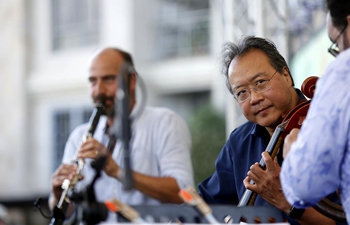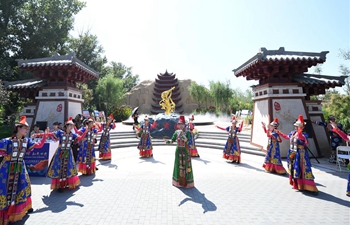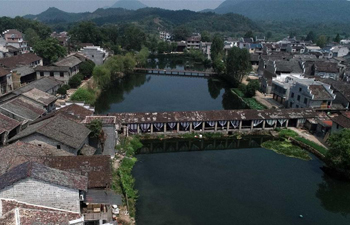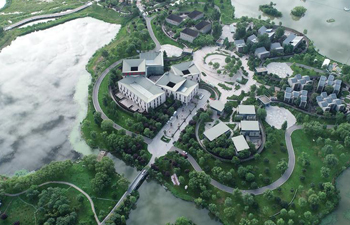by Xinhua writer Xu Jianmei
HAMPTON, United States, Aug. 26 (Xinhua) -- Four hundred years have passed, and now a mix of pain, anger and hope still lingers across the United States, especially in Hampton, in the state of Virginia, where a three-day commemorative ceremony marking the 400th anniversary of the arrival of the first enslaved Africans just concluded on Sunday.
DARK CHAPTER IN HISTORY
Transatlantic slave trade was already underway in the 1500s, though for British colonies in America, it was August 1619 that historians fixed as the pivot point for ushering in the slavery era, a 254-year-long dark chapter in the history of the United States.
In late August, a 160-ton Dutch privateer flying a British flag named the White Lion came ashore at Point Comfort, the present-day Fort Monroe in Hampton. The ship "brought nothing but 20 and odd negroes" who were traded for food and supplies by British colonists at "the best and easiest rates they could," according to the Hampton History Museum.
Five years later, as listed in the Virginia Census, two of these African captives, identified as Anthony and Isabella, had a son named William, the first recorded birth of an African in the British colonies.
The slave trade exploded over the next 150 years. As Congress prepared to outlaw the slave trade in 1807, more than 24,000 Africans were kidnapped and taken to the United States, the largest influx in its history, according to a USA Today report.
Meanwhile, far more African Americans were born into slavery generation after generation, said the report, noting that by 1810, over 1 million people were enslaved in the country and the number skyrocketed to 4 million when the Civil War broke out 50 years later. The war brought slavery to an end, but then followed a long period of racial segregation, whose bitter consequences still haunt the nation today.
"The slave trade was one of the most cruel atrocities ever perpetrated by humankind," Democratic Senator Tim Kaine said Saturday at the 2019 African Landing Commemorative Ceremony in Fort Monroe attended by some 2,000 people.
Ibram Kendi, director of the Antiracist Research and Policy Center at American University, said "there is history in regular African Americans behind the scenes surviving the regularity of racist policies, ideas, abuse, and violence for 400 years."
"The first Africans' arrival in Virginia launched a system of oppression that fundamentally shaped our nation and culture and laid the foundation for generations of African Americans and their descendants," said the Hampton 2019 Commemorative Commission on its website. "Hampton is where American slavery began."
PAIN, ANGER AND HOPE
At 3 p.m. Eastern Time (1900 GMT) on Sunday, designated as "Healing Day," national parks across the country, including Fort Monroe National Monument, rang bells simultaneously for 4 minutes, representing the four centuries since the start of slavery on U.S. soil.
The commemorative ceremony in Hampton also witnessed a wreath-laying reflection on Friday at the secluded grassy Tucker Family Cemetery, where a plaque reads "First Black Family," as well as a sunrise cleansing and African naming ritual on Saturday at a beach near Fort Monroe.
"I just wanted to find more about myself. That's why I came to get closer," Aisha Moody, a federal government employee from Seattle, in the northwestern state of Washington, told Xinhua following Saturday's ritual, where she was given an African name, Maduwo, meaning "a mother" in Fulani.
"It matters to connect to the ancestry. A lot of black people don't know where they come from. We really don't have a history. So it was good to come here to learn more about our history," said Moody.
Also on the agenda were a parade of flags, a flower petal-throwing ceremony, a series of keynote speeches, panel discussions, concerts, exhibitions, dances and black heritage tours before a 21-gun salute ended the closing ceremony on Sunday evening.
The organizers said that they hope the program would not only enhance public awareness for the sufferings and contributions of African Americans, but also help the nation "capture the spirit of healing and reconciliation."
Yet, Ebony Hood, a 46-year-old woman from Cleveland, in the midwest state of Ohio, told Xinhua in Hampton that she still feels "pain and anger" for what her African ancestors suffered 400 years ago.
The impact of slavery on today's American society is still visible as racial discrimination prevails, she said.
Her remarks were similar to those of tax accountant Timothy Brady and his wife Deborah, a couple visiting Fort Monroe from Brooklyn in New York.
"What happens is that you can't still help feeling a little bit anger because the situation is still going on 400 years later ... people still see so many signs of racism going on, so it's like the country hasn't really healed completely yet," Brady told Xinhua.
"We just hope that it (the commemoration) doesn't stop here ... It should go beyond that," said Deborah, a real estate manager. "It's a challenge that we have to go through ... Racism still exists and will stick in the long term."
"We know that racism and discrimination aren't locked in the past. They weren't solved with the Civil Rights Act. They didn't disappear. They merely evolved," Virginia Governor Ralph Northam said Saturday at Fort Monroe. "We need to take action."













